What Is Pulmonary Edema?
Pulmonary edema means there is extra fluid in your lungs. This fluid makes it hard to breathe. Pulmonary edema prevention is important for your lung health. When fluid builds up, it can cause serious health problems. Often, this condition happens quickly. However, it can also develop slowly over time. Knowing what it is helps you take steps to prevent it.
Common Causes and Risk Factors
Many things can cause fluid in the lungs. Some people are at higher risk than others. Understanding these causes and risk factors can help you stay safe. For example, heart problems are a leading cause. But, other reasons exist too.
Because these factors increase your risk, it is wise to manage them early.
Recognizing Early Symptoms
Early signs of pulmonary edema can be mild. Still, you should not ignore them. If you notice these symptoms, act quickly. Early care can prevent serious problems.
If you have these symptoms, you may need medical help. Early action can save lives.
Top Tips to Prevent Pulmonary Edema
Preventing pulmonary edema is possible with simple steps. Because prevention is better than cure, try these tips:
Because these steps are easy to follow, you can start today.
Lifestyle Changes for Lung Health
Healthy lifestyle choices support your lungs and heart. In addition, they lower your risk of fluid in the lungs. Try to make these changes part of your daily life.
Because small changes add up, your lungs will thank you.
When to Seek Medical Help
Sometimes, you need a doctor right away. If you notice sudden shortness of breath, chest pain, or coughing up pink fluid, call for help. These signs may mean you have pulmonary edema. Quick treatment can prevent serious harm. In the United States, call 911 for emergencies. For less urgent symptoms, see your doctor soon. Early care is always best.
Reliable Resources and References
For more information on pulmonary edema prevention, visit these trusted sources:
These sites offer up-to-date advice and facts. You can trust their information.
Consult a pulmonologist for personalized advice on preventing pulmonary edema.
